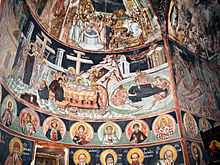Poganovo monastery

View of the Poganovo monastery. |
| Monastery information |
|---|
| Full name |
Манастир Светог Јована Богослова - Погановo |
|---|
| Other names |
Monastery of St. Jovan Bogoslov |
|---|
| Order |
Serbian Orthodox |
|---|
| Established |
~1390 |
|---|
| Dedicated to |
Saint John the Theologian |
|---|
| Diocese |
Eparchy of Niš |
|---|
| People |
|---|
| Founder(s) |
Constantine Dragas |
|---|
| Site |
|---|
| Location |
Gorges of Jerma, Dimitrovgrad |
|---|
The Monastery of St. Jovan Bogoslov or Poganovo monastery (Mанастир Погановo) is a Serbian Orthodox monastery situated in the gorges of the river Jerma, near the village Poganovo, municipality of Dimitrovgrad, Serbia.
The frescoes were made by masters from Northern Greece.[1] Frescoes inscriptions are in Church Slavonic language.
Poganovo Monastery was protected by Serbia since 1949, and declared Monument of Culture of Great Importance in 1979, and it is protected by Republic of Serbia.[2]
History
Recently, two scholars have introduced Jefimija into the discussion regarding the patronage of the famous bilateral icon representing a vission of the prophets Ezekiel and Habakkuk on one side and the Mother of God with St. John the Theologian on the other. Formerly at the monastery of John the Theologian at Poganovo, Serbia, the is now kept in the National Gallery Sofia, Bulgaria: G. Babić, 'Sur l'icônede Poganovo el la Vasilissa Hélèn', in D. Davidov, ed., L'Art de Thessalonique et des pays Balkaniques et les courants spirituels auXIVe siècle (Belgrade, 1987), pp 57-65; G. Subotić, Ikona vasilise Jelene i osnovaći manastira Poganova, Saopštenja 25 (1993), pp. 25-40. Both authors argue against earlier opinions based on a partly preserved inscription, in Greek, that the icon was a gift of the Empress Helena Dragaš, wife of Byzantine Emperor Manuel II Palaiologos (1391-1425). They suggest that the donor may be Jelena/Jefimija, who as a wife of a Despot would have had, in the late period, the title of valissa.
See also
References
Further readings
Coordinates: 43°00′26″N 22°47′04″E / 43.00722°N 22.78444°E / 43.00722; 22.78444
|
|---|
| | Archaeological sites | | |
|---|
| | Monuments of Culture |
- Exceptional Importance
- Great Importance
- Protected
|
|---|
| | Historic Landmarks | |
|---|
| | Spatial Cultural-Historical Units | |
|---|
|
|
|---|
|
| |
|
|---|
| | Metropolitanates | |
|---|
| | Traditional dioceses | |
|---|
| | Diaspora dioceses | |
|---|
| | Ohrid Archbishopric |
Metropolitanates | |
|---|
| Dioceses |
- Prespa and Pelagonija
- Bregalnica
- Debar and Kičevo
- Polog and Kumanovo
- Veles and Povardarie
- Strumica
|
|---|
|
|---|
| | Defunct | |
|---|
| |
|
|---|
|
| |
|
Patriarchs (since 1346) |
|---|
|
1346–1463 |
- St. Joanikije II
- Sava IV
- St. Jefrem
- St. Spiridon
- Danilo III, Patriarch of Serbia
- Sava V
- Danilo IV
- St. Kirilo
- St. Nikon
- Teofan
- Nikodim II
- Arsenije II
|
|---|
| 1557–1766 |
- St. Makarije Sokolović
- Antonije Sokolović
- Gerasim Sokolović
- Savatije Sokolović
- Nikanor
- Jerotej
- Filip
- Jovan
- Pajsije I Janjevac
- St. Gavrilo I Rajić
- Maksim Skopljanac
- Arsenije III Čarnojević
- Kalinik I Skopljanac
- Atanasije I
- Mojsije Rajović
- Arsenije IV Jovanović Šakabenta
- Joanikije III Karadža-Grk
- Atanasije II Gavrilović
- Gavrilo II Sarajevac
- Gavrilo III
- Vikentije Stefanović
- Pajsije II Grk
- Gavrilo IV Grk
- Kirilo II
- Vasilije Jovanović-Brkić
- Kalinik II Grk
|
|---|
| since 1920 | |
|---|
|
| |
| |
| |
|---|
|
- Leontije Lambrović
- Agatanel
- Antim
- Melentije Pavlović
- Petar Jovanović
- Mihailo Jovanović
- Teodosije Mraović
- Inokentije Pavlović
- Dimitrije Pavlović
|
| |
|
| |
| |
|
|---|
| | Serbia |
| |
|---|
| | Montenegro | |
|---|
| | Bosnia and Herzegovina |
|
|---|
| | Croatia |
- St. Petka's Church, Banovci
- Church of the Transfiguration of the Lord, Trpinja
- Church of St. Nicholas, Vukovar
- Church of Pentecost, Vinkovci
- Church of St. George, Kneževo
- Church of Assumption of Blessed Virgin, Negoslavci
- Church of Pentecost, Markušica
- Church of St. George, Bobota
- Church of St. Stephen, Borovo
- Church of the Nativity of the Virgin, Srijemske Laze
- Church of St. Peter and Paul, Bolman
- Church of St. Stefan Štiljanović, Karanac
- Church of St. Nicholas, Mirkovci
- Church of the Nativity of the Virgin Mary, Gaboš
- Church of St. Nicholas, Jagodnjak
- Church of St. Demetrius, Dalj
- Zagreb Orthodox Cathedral
- Church of St. George, Grubišno Polje
- Church of St. Nicholas, Karlovac
- Church of Nativity of the Virgin, Drežnica
- Church of the Holy Apostles Peter and Paul, Štikada
- Orthodox church of st. George, Varaždin
- Holy Annunciation Orthodox church, Dubrovnik
- Orthodox Church in Knin
- Church of St. Peter and Paul, Tepljuh
- San Spirodine Church, Peroj
- Church of St. Nicholas, Rijeka
- Church of St. Nicholas, Vrlika
- Orthodox church of Holy Salvation, Cetina
|
|
|---|
| | Other countries |
- Saints Constantine and Helen Serbian Orthodox Church, USA
- Trinity Chapel Complex, USA
- Saint Sava Serbian Orthodox Church, Jackson, USA
- Sts. Cyril and Methodius Church, Slovenia
- Serbian Church (Arad), Romania
- St. Sava Church, Paris, France
- Church of the Holy Prince Lazar, United Kingdom
- Serbian Orthodox Church, Halifax, United Kingdom
- St. Nicholas, West Wycombe, United Kingdom
- Saint Spyridon Church, Trieste, Italy
- Annunciation Church, Szentendre, Hungary
- Transfiguration Church, Szentendre, Hungary
- Church of Our Lady, Göteborg, Sweden
|
|---|
| | Notes | |
|---|
| |
|
|



